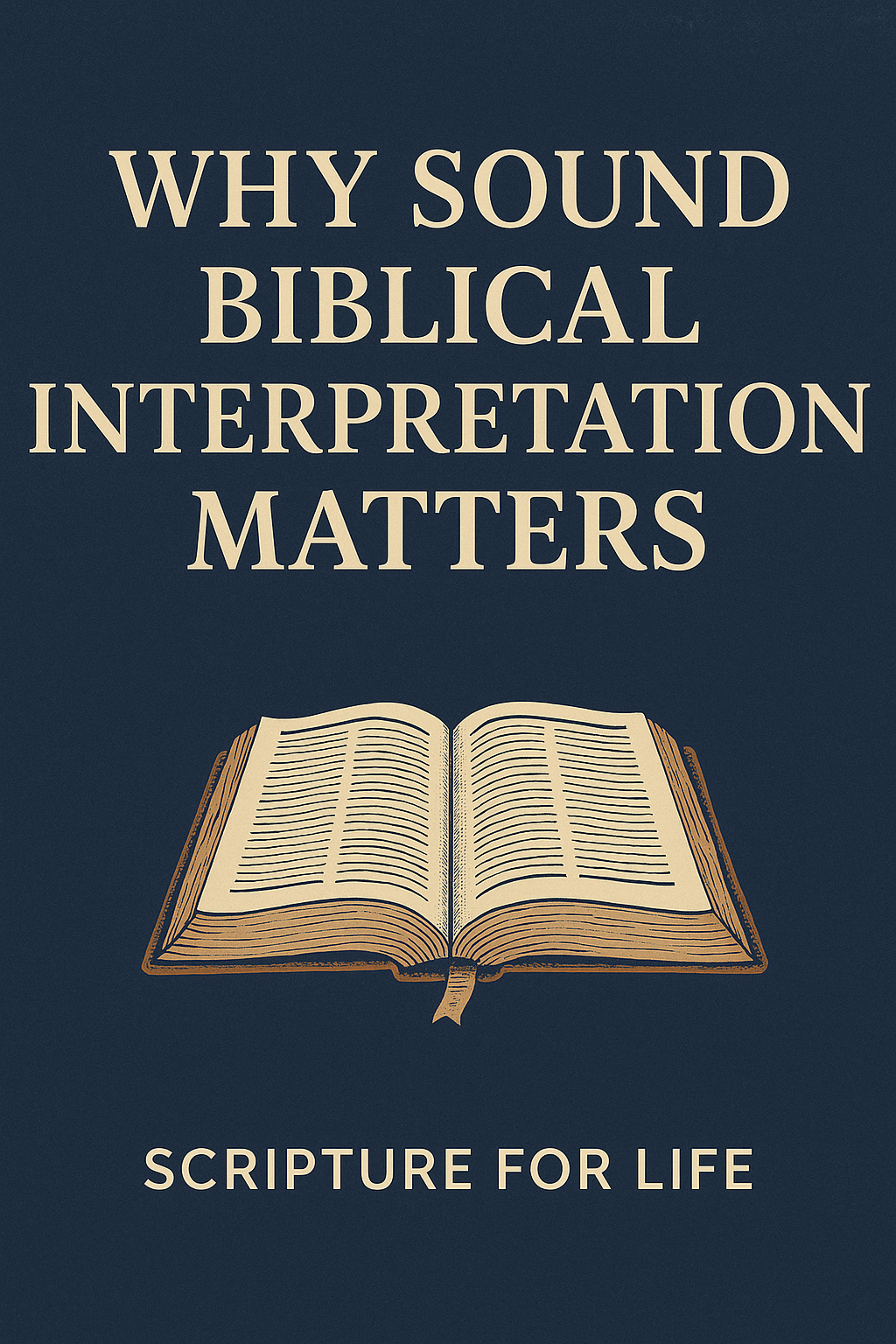⏱️ Estimated Reading Time: 6 min read
Why a Sound Hermeneutic Matters: Reading the Bible with Clarity and Conviction
We live in a day when many—even within the Church—approach the Bible as if it’s just another book. But the Bible is not merely a religious text or a source of inspirational quotes. It is the inspired, inerrant, infallible, sufficient, clear, and authoritative Word of the living God. Because of this, we must read and interpret it rightly. That’s why the literal-grammatical-historical method of biblical interpretation matters. It’s not ivory-tower academia—it’s the Church’s faithful response to the confusion of our age.
The Bible Is Clear, Trustworthy, and Understandable
God has not mumbled. His Word is not hidden in mystery or reserved for scholars. While not every passage is equally easy to understand, the essential truths of Scripture are clear and accessible to those who humbly read and seek God’s wisdom.
“The unfolding of your words gives light; it imparts understanding to the simple.” —Psalm 119:130
The Bible consistently testifies to its own clarity and purpose. From Genesis to Revelation, it tells us who God is, who we are, and how we are to live. It reveals the way of salvation, the character of God, and the hope of redemption through Christ.
To approach the Bible rightly is to believe that God speaks truthfully and clearly. That means we must not twist Scripture to fit our preferences or culture. Instead, we come under it, seeking to understand what God has actually said.
What Is the Literal-Grammatical-Historical Method?
This method of interpretation aims to discover the original, intended meaning of the text by examining its words, grammar, and historical setting. It helps us rightly divide the Word of truth (2 Tim. 2:15) instead of reading our own ideas into the text.
Literal
We take the text at face value unless the genre or context clearly indicates symbolism or figurative language.
Example: When Jesus says He is the “door” (John 10:9), He’s using a metaphor. But when He says He is “the way, the truth, and the life” (John 14:6), He means exactly what He says.
Grammatical
We pay close attention to sentence structure, verb tenses, and grammar. These details matter deeply in understanding what is being communicated.
Example: In Ephesians 2:8–9, the Greek grammar shows that salvation—including faith—is a gift of God, not something we contribute to.
Historical
We consider the cultural and historical background of the text and its original audience.
Example: Jeremiah 29:11 is often misunderstood as a prosperity promise. But in context, it’s a word of hope for Israel in exile. That historical understanding deepens, rather than diminishes, its comfort.
Why This Matters in 2025
In our time, issues like gender identity, sexuality, social justice, and the nature of salvation are all shaped—either rightly or wrongly—by how people interpret Scripture. The problem isn’t that the Bible is unclear; the problem is how it’s being read.
When churches allegorize plain commands or read culture into Scripture, they surrender truth. The literal-grammatical-historical method safeguards us from such compromise. It grounds our faith in what God actually said, not in what we want Him to say.
How to Read Scripture Faithfully
- Pray for understanding (Psalm 119:18)
- Read the whole passage, not just a verse
- Ask key questions: Who wrote it? To whom? What was happening?
- Observe the grammar: repeated words, connecting phrases, and verbs
- Use trustworthy tools: A study Bible, commentary, or dictionary
- Ask how it points to Christ and what God is saying about Himself
Beware of Allegory Without Biblical Warrant
One of the dangers of misinterpretation is allegorizing what should be taken plainly. The early church father Origen made this mistake often, turning real events into abstract symbols. Today, the same error is widespread in prosperity theology, where promises are pulled out of context and applied as guarantees of health and wealth.
The literal-grammatical-historical method keeps us anchored. It reminds us that the Bible means what God intended it to mean. Our role is not to invent new interpretations but to humbly receive and apply what God has revealed.
Encouragement for the Church
You don’t need a seminary degree to read the Bible faithfully. While education can serve the Church, every believer is called to love and rightly handle God’s Word. With a humble heart, teachable spirit, and sound approach, any Christian can grow in discernment and spiritual maturity.
When we take God at His Word, read it rightly, and live it out—we become anchored in truth, equipped for the storms of life, and prepared to stand firm in a world full of confusion.
“Let the Bible be its own interpreter.” —Martin Luther
“When the plain sense of Scripture makes common sense, seek no other sense.” —Attributed to John Calvin
Explore More:
- Scripture for Life Series
- The Importance of Hermeneutics in the Christian Life
- Hermeneutics: The Art and Science of Biblical Interpretation
Reflection Questions:
- Have you ever misunderstood a passage before learning its context?
- What’s one Scripture that became clearer through proper interpretation?
- Why is it dangerous to read our opinions into the Bible?
- How can you help others grow in biblical literacy?
- What steps can you take this week to study the Bible more faithfully?
Recommended Tools:
- The Word Explored — Dave Jenkins
- Knowing Scripture — R.C. Sproul
- MacArthur Bible Handbook — John MacArthur
- ESV Study Bible
Let’s be people who love the Word, read it rightly, and live it with conviction and grace. The Church doesn’t need more opinions—it needs faithful voices grounded in the unchanging truth of God’s Word.
❓ Frequently Asked Questions
What does “hermeneutics” mean?
Hermeneutics is the study of how we interpret the Bible. It helps us understand what the original authors intended, avoiding misinterpretation or misuse of Scripture.
Why is the literal-grammatical-historical method preferred?
Because it seeks to understand the text in its original context, grammar, and meaning, rather than reading modern ideas or allegory into the passage.
Isn’t the Bible open to many interpretations?
No. While people often interpret it differently, the Bible has one intended meaning per passage. Good interpretation seeks to understand what God meant, not what we feel.
Do I need a seminary degree to study the Bible well?
Bible college and seminary can be helpful for further and more intense study, but it is not required. Tools help, but faithful reading with prayer, context, and a humble heart equips every believer to understand and apply God’s Word.
What’s the danger of misinterpreting the Bible?
Misinterpretation can lead to false doctrine, spiritual harm, and distorted views of God. It’s why sound hermeneutics is essential for every Christian.
Dave Jenkins is happily married to his wife, Sarah, and lives in beautiful Southern Oregon. He is a writer, editor, and speaker who loves Christ, His people, the Church, and sound theology.
Dave serves as the Executive Director of Servants of Grace Ministries and the Executive Editor of Theology for Life Magazine. He is the Host and Producer of the Equipping You in Grace Podcast and a contributor to and producer of Contending for the Word.
He is the author of The Word Explored: The Problem of Biblical Illiteracy and What To Do About It (House to House, 2021), The Word Matters: Defending Biblical Authority Against the Spirit of the Age (G3 Press, 2022), and Contentment: The Journey of a Lifetime (Theology for Life, 2024).
You can connect with Dave on Facebook, X (Twitter), Instagram, YouTube, or subscribe to his newsletter.
When he is not engaged in ministry work, Dave enjoys spending time with his wife, going to movies, sharing a meal at a favorite restaurant, or playing a round of golf with friends. He is also a voracious reader, particularly of Reformed theology and the Puritans, and is often found working through a stack of new books from a wide range of Christian publishers.
Dave earned his M.A.R. and M.Div. from Liberty Baptist Theological Seminary.




